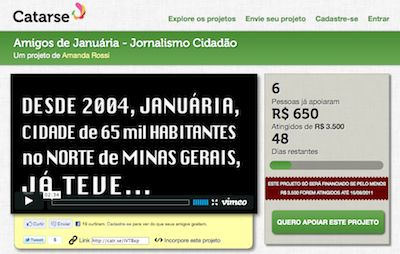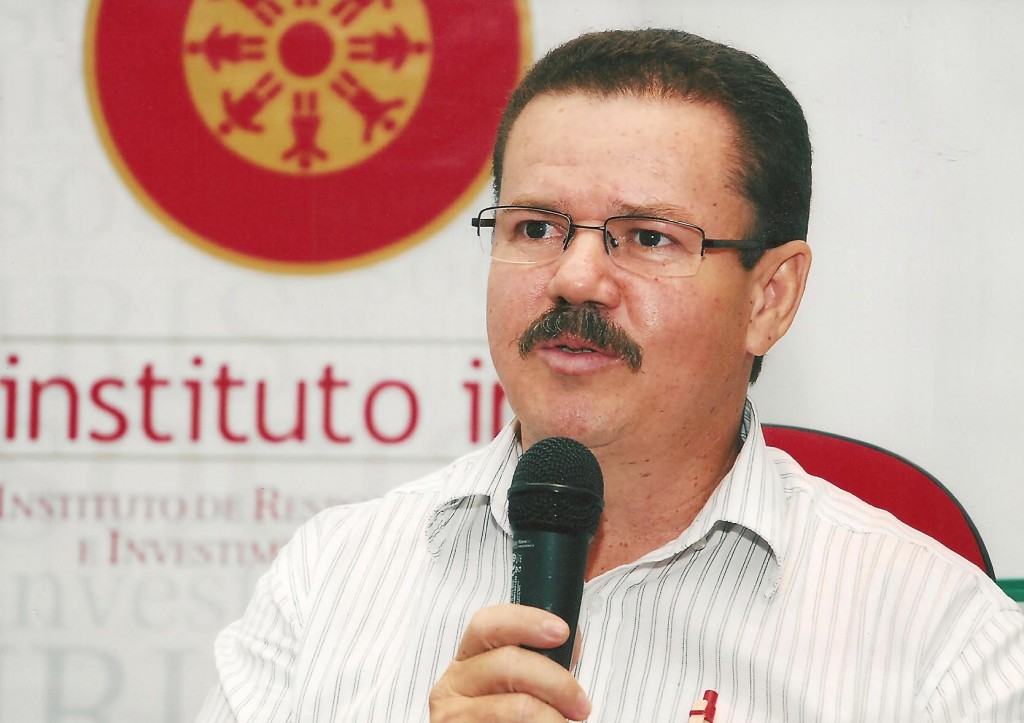Monthly Archives: June 2011
Crowds can also help Friends of Januária
Since Rising Voices gave us the opportunity to make this citizen media project a reality, we have had great surprises! Thanks to RV's support, we have been connecting with many people and other organizations that like the project and want to help it somehow! That gave us even more enthusiasm to do the best we can!
Some people has given us fantastic ideas, others have offered to publicize the project's activities and, finally, there are those who want to help fund the project with small amounts of money. Well, we have always imagined what a better project we could do if we had more funding… especially because the final RV grant ended up being a little bit smaller than the amount we asked for.
Meanwhile, we have also connected with a nice brazilian crowdfunding site, called Catarse (http://catarse.me). We sent our project to its crew and told them the amount of extra money we would need. They really liked the project and decided to support it by adding it to Catarse!

At last, our biggest news is that the public can also help Friends of Januária at Catarse! Anyone with a credit card can donate. The smallest contribution available is only R$ 10 (around US$ 6)! Our final deadline is August 14th! If you know someone that may want to support us, you can help us by sending the following link to those interested:
http://catarse.me/en/projects/198-amigos-de-januaria-jornalismo-cidadao
We already have an English version of it and we will see if we can publish it as well.
We are asking for R$ 3.500 total. Catarse has some administrative fees and after accounting for the rewards we will offer to those who support us, the sum of money that would become available to the project is R$ 2.800 (something like US$ 1,750).
This funds will be used, for example, to buy multimedia equipment (our estimated budget for this was US$ 600, which could only buy a very simple video camera in Brazil), pay for one or two extra visits to Januária, print better course materials, and help trainers pay for their accommodation in the town.
But don't panic! If we don't succeed in achieving this extra funding, the project will still happen. With the Rising Voices grant – in addition to some volunteer aid from the trainers – we can make it! The main reason we are looking for more money is because we believe the project could become stronger with extra support!
Anyway, we are being positive! We think we will get the extra support we asked for from brazilian crowdfunding site! On the second day, we already got 19% of the amount we asked for! Great, isn't it??! : )
Barriers to access to information in Brazil
Today we will to talk a little more about the situation of access to information in the municipalities of Brazil.
Brazil has a lot of norms with instructions on access to information (you can see some of them in Portuguese here). On the municipal level, there is a federal law (see the text in Portuguese here) that says that information about public budget and expenditures should be made available in real time through the Internet.
Although this law was published two years ago, until now 68,5% municipalities with population between 50.000 and 100.000 have transparency websites. And this doesn't mean that they have proper information on public budget!
If a person tries to access information by making a formal request to the responsible party, there are still a lot of barriers to the access. Some of the common excuses given to restrict information are:
“I can't give you this information because it is secret”
“We don't have enough employees to do this”
They also argue that the person that demands information should pay for the xerox copy of it. Another strategy is to mix a lot of documents and give them so the requester has to find the information there. So, although the law assures citizens their right to information, it still doesn't details basic procedures how information should be given.
And what all this has to do with Januária?
Access to information is a powerful tool for the ones that want to change the situation of corruption. The case of Asajan (Associação Amigos de Januária) is an example of how information can empower the citizens: with help from people that gives them data on public expenditures they have helped the Judiciary in finding important cases of corruption.
Updates
The citizen media project Friends of Januária has had some important achievements in the last weeks. We are just waiting for some confirmations to share them with you, so be prepared for some good news in the next posts!
If you are interested in knowing more about access to information, here is a nice article by Suzanne J. Piotrowski: The Operationalization of Municipal Transparency: Primary Administrative Functions and Intervening Factors.

